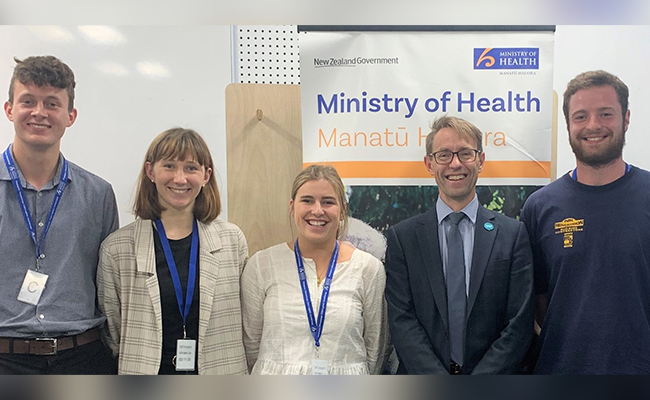
Otago students Blair McInnarney, Olivia McKenzie, Phoebe van Boheemen and Harry Becker with Dr Ashley Bloomfield (fourth from left).
Four University of Otago students are experiencing the opportunity of a lifetime working on COVID-19 research projects at the Ministry of Health Manatū Hauora as part of the summer studentship programme.
The students are Phoebe van Boheemen and Olivia McKenzie (both fifth-year medical students at the Wellington campus this year), Blair McInnarney (beginning his third year of a BSc majoring in anatomy at the Dunedin campus this year) and Harry Becker (starting his fourth year of a BBiomedSc degree in Dunedin this year).
Getting the students involved was the inspiration of Otago alumna Tara Swadi, who is now Chief Advisor Public Health in the COVID-19 Directorate at the Ministry of Health.
Ms Swadi, who studied microbiology and immunology from 2012 to 2015 and completed her Bachelor of Biomedical Sciences Honours degree at the Christchurch campus in 2016 was a summer research student herself in 2015.
The experience made her aware of the benefits of the programme and she was keen to offer the opportunity to other Otago students.
“I thought what an amazing opportunity this would be to expose students to the wide variety of work going on in the Ministry and give them a really broad picture of the health system as a whole.”
Enlisting summer students has enabled the Ministry to get more of the detailed data it has on COVID-19 analysed in order to better inform the country's ongoing pandemic response, she says.
“We also had some burning questions we were keen to find answers to, which the students have helped with.”
The four students have each been assigned to different research projects which span many areas of the COVID-19 response: researching testing regimes used overseas; looking at infection prevention and control (IPC) protocols in key transit airports to New Zealand; reviewing how genome sequencing has been used; and analysing communications with community health care workers.
“Getting them in was such a relief because there was uncertainty all the way through about our COVID-19 status, and whether we would go into lockdown again.”
Phoebe van Boheemen, who has been interviewing health workers to discuss their experiences managing the pandemic, says it has been an amazing opportunity.
“I was very excited when I realised we would be based at the Ministry for our projects. It is pretty incredible going from watching and learning about how our country is going to tackle COVID-19 from the living room to being literally surrounded by all of the people actually making all of the massive decisions.”
All four students got to meet and discuss their projects with Director-General of Health Dr Ashley Bloomfield during their first week at the Ministry.
Phoebe says they also attended a COVID-19 directorate event, where the different teams at the Ministry talked about their experiences and work over the past 12 months.
“That was pretty incredible to hear about all that goes into contact tracing and setting up the MIQ facilities. I think I have only begun to appreciate the massive amount of work that has gone into New Zealand's pandemic response and the sheer number of people still working constantly to maintain our management of COVID-19.”
Ms Swadi says the collaboration has worked very well.
“The students have fit in wonderfully and are making a real and tangible contribution to New Zealand's COVID-19 response. We've been very lucky to have them.”
Ms Swadi's initial request for summer students was directed to the Dunedin campus and then passed on to University of Otago, Wellington Summer Studentship Manager Dr Rachael Mason to organise through the capital city campus.
She couldn't have been more happy to help, but remembers feeling relieved when she finally placed the students at the Ministry.
“Getting them in was such a relief because there was uncertainty all the way through about our COVID-19 status, and whether we would go into lockdown again.”
It has been a once-in-a-lifetime opportunity for the students, she says.
“They have been taken in like staff members, they have got to meet Dr Bloomfield, and they've had some time with him to discuss their projects and ask questions of him. They were there when Prime Minister Jacinda Ardern visited.”
The students each have two supervisors, one from the Ministry and one from the University. The University supervisors are Dr Mason; Dr Michelle Thunders, from the Department of Pathology and Molecular Medicine, Dr Julie Bennett from the Department of Public Health and Dr Clint Gray from the Department of Paediatrics and Child Health.
Dr Mason says the 10-week summer research programme offers a unique opportunity for students to experience research, which they may not otherwise be exposed to in the course of their academic degree programmes.
This year, the Wellington campus has 45 students in summer research roles. Along with the placements at the Ministry of Health, students are working on the University's Wellington and Dunedin campuses, the Capital and Coast and Hutt Valley District Health Boards and at Palmerston North Hospital.